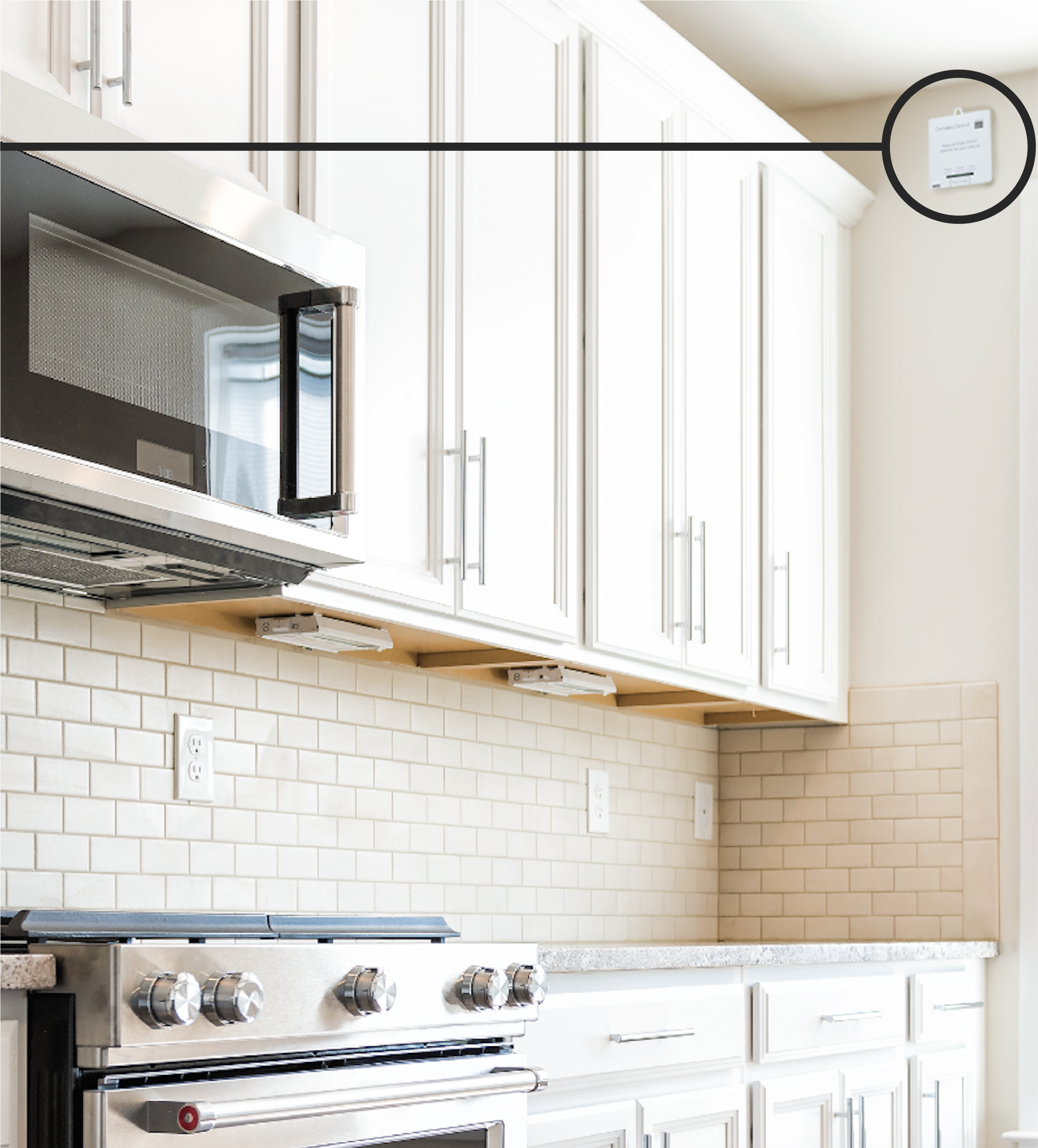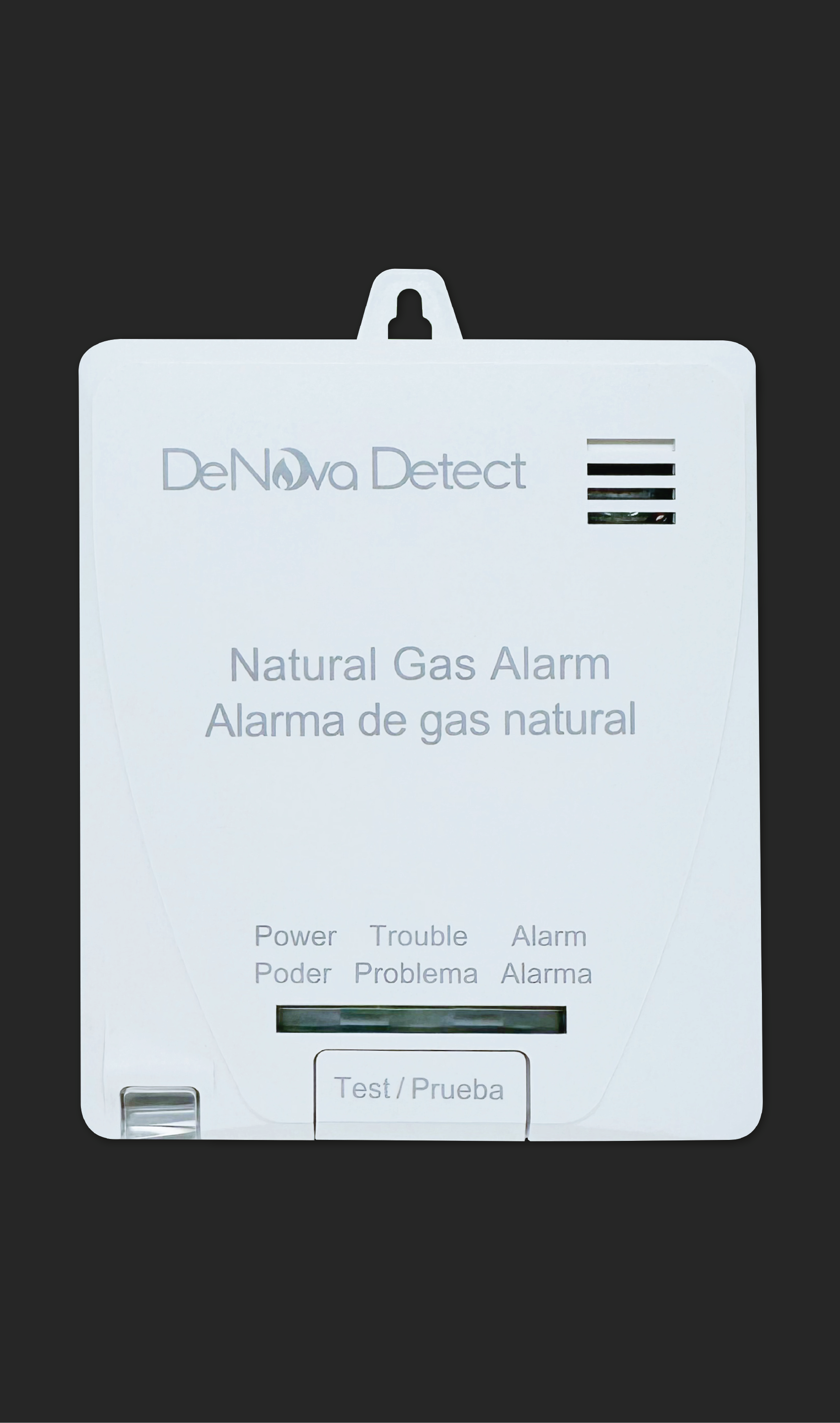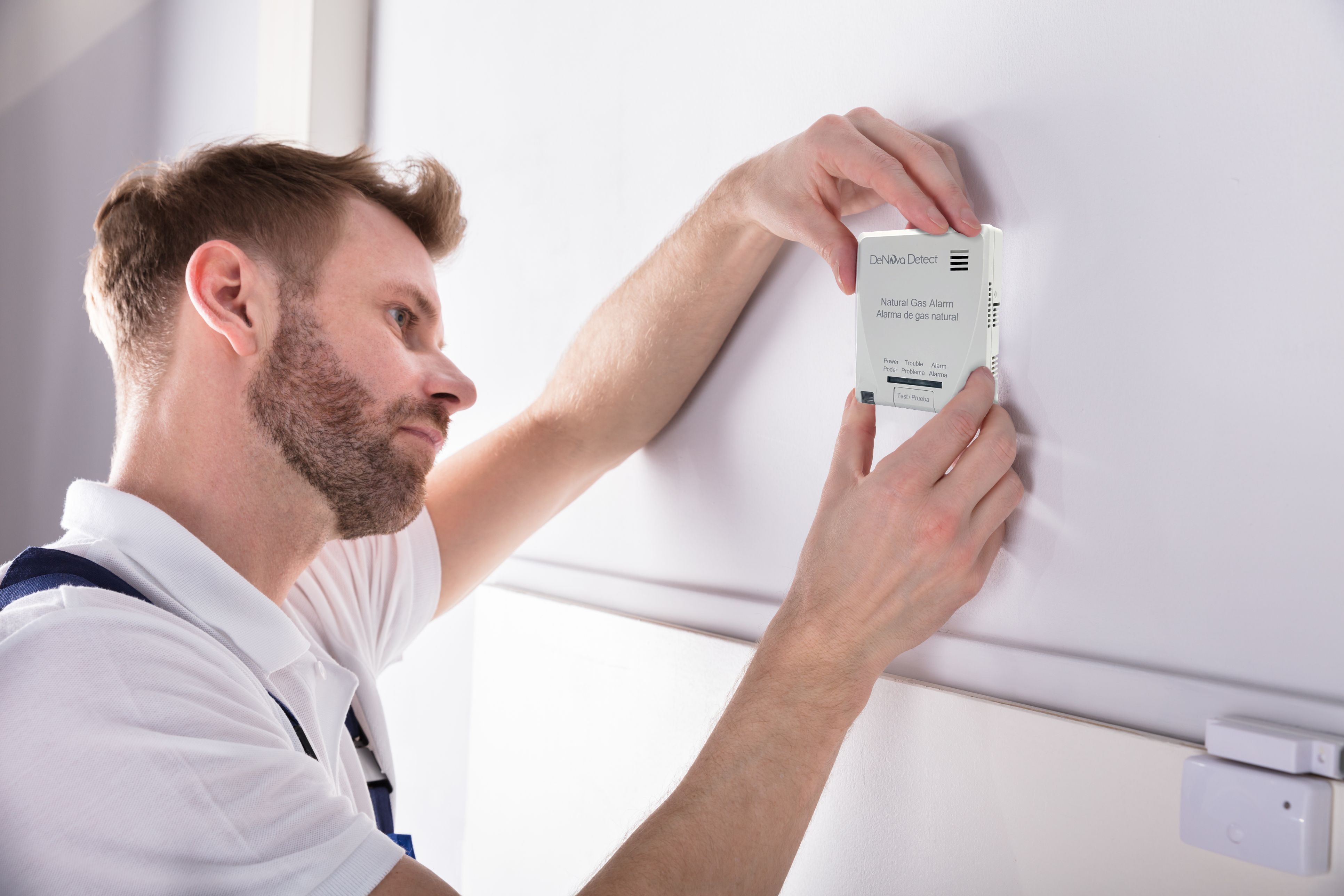
Where To Install Natural Gas Alarms
Natural Gas Alarms should be installed in all rooms where a gas leak may occur or a gas appliance is located. Examples include kitchens (gas leaks from gas ovens and cook tops), laundry rooms (gas leaks from a gas clothes dryer), and furnace areas (gas leaks from furnace burners or boilers).
Gas leaks may migrate along pipes, so consideration should be given to installing Natural Gas Alarms in multiple rooms. Homeowners should also consider placing a gas detector in each bedroom where an occupant closes the door while sleeping.
Although it is important to install Natural Gas Alarms in rooms were gas appliances exist, it is recommended that gas detectors be placed as far away from these appliances as possible. The alarm should be installed between 3 and 10 feet away from a gas appliance and within 12 inches from the ceiling. The placement recommendations are intended to keep Natural Gas Alarms at a reasonable distance from a gas source. This reduces the “unwanted” false alarms that can occur if a gas detector is placed directly next to a gas source.
Avoid placing a Natural Gas Alarms near a cooking appliance or cooktop hood. If no other options are available, install at least 5 feet from cooking appliance or cooktop hood. This is recommended because cooking vapors or grease may contaminate the Natural Gas Alarm.
See Manual Here
Product Should Be Installed
1.) Within 12 inches from the ceiling
2.) In an area where it will not be impeded by items hanging from or near the ceiling such as curtains, drapes, ceiling fans
3.) At least 5 feet from cooking appliance or cooktop hood
4.) At least 10 feet from gas appliances

Product Should Not Be Installed
1.) In the peak of a cathedral ceiling
2.) Directly above or near sources of water or humidity such as a sink, cooktop, dishwasher or shower
3.) Next to a door or window
4.) Next to a ventilation fan
5.) Near a room return or HVAC duct
6.) In an area where the temperature will drop below 32°F (0°C) or exceed 122°F (50°C)
7.) In an area that is dusty or dirty
8.) In an area where organic solvents exist
9.) In a damp or very humid location, such as a bathroom
10.) Outside
Frequently Asked Questions
When is it time to replace an alarm?
The natural gas alarm should be replaced when the End-of-Service-Life (or EOL) Alert activates on your device. When this happens, the Trouble (Yellow) LED on the device will begin to blink twice every 10 seconds, and the audible alert will beep twice and say "Please replace detector" once every minute. This will occur approximately 6 years (model: ML-310ES) or 7 years (model: 807NAS) after device installation.
How do I open the battery cover and install the battery?
- Open the battery cover on the back of the detector.
- This cover slides out of place. To open, place both thumbs on the back of the battery cover where the battery cover hooks snap into place.
- Push down where the battery cover snaps into place with your thumbs and slide the cover out. Some force is required.
- Connect the included lithium battery by inserting the battery harness connector into the product.
- Do NOT remove the plastic wrap surrounding the battery pack.
- The battery connector has a large notch on it that faces up when installed correctly. There is only one way in which the connector can be installed. A small portion of the connector will be exposed when connected properly. You should hear it click into place.
- After connecting the battery, place the battery with the labels facing down and the battery wires wrapping around the top side of the battery pack. For the best fit, it is recommended to have the negative (-) terminals face toward the outer edge of the detector.
What should I do if the DeNova Detect Natural Gas Alarm's audible gas leak alarm sounds?
If at any time your natural gas detector's alarm sounds or if you ever smell or hear a natural gas leak:
- Evacuate immediately and take others with you.
- Do not use a phone; light a match; turn on or off lights, flashlights, or appliances; start a car; or do anything else that could create a spark or flame and cause the gas to ignite or explode.
- Call 911 once you are safely outside the premises. You can report leaks anonymously.
- Do not re-enter the premises until told to do so by authorities.
In the event of a gas leak, you may smell natural gas before the natural gas detector's alarm is activated. Whether or not the unit's alarm is sounding, if you smell gas, act fast. Report the leak once you are safely outside.
How do I recognize a gas leak?
- Smell - A distinctive, strong odor similar to rotten eggs
- See - A white cloud, mist, fog, bubbles in standing water, blowing dust, or vegetation that appears to be dead or dying for no reason
- Hear - Roaring, hissing, or whistling
Do I need to perform any maintenance on my Natural Gas Detector?
The natural gas detector was designed to be as low maintenance as possible. If the unit begins to sound its low battery signal - a single intermittent chirp - contact New Cosmos Electric Co. at 1-847-749-3064 to obtain a replacement battery; these batteries are not available in stores.
The manufacturer recommends testing the unit at least once a week and cleaning the unit once a month by gently vacuuming the outside of the unit; do not use water, cleaning, and maintenance.
Will the Natural Gas Detector continue to work if the power goes out?
Yes. Since the unit is powered by an internal battery, the natural gas detector should continue to function during a power outage.
Will the Natural Gas Detector monitor my home for smoke, fire, carbon monoxide (CO) or other gases?
No, the natural gas detector will only detect the presence of natural gas in the area where the unit is installed. It will not detect fire, heat, smoke or the presence of any other gases, including carbon monoxide (CO).
Will the Natural Gas Detector monitor all areas of my home for possible gas leaks?
No, the natural gas detector will only monitor the air in the area where the unit is installed. Natural gas leaks could be present in other areas and/or on other floors of your home or building without reaching the natural gas detector. As such, the unit's alarm may not sound in the event of a natural gas leak in a remote part of your home or building. Doors or the obstructions may also affect the rate at which natural gas reaches the natural gas detector. You should install separate gas detectors as needed in other areas of your home where natural gas appliances are used.
If the Natural Gas Alarm's audible gas leak alarm is activated, will it be audible throughout my entire home?
No, the natural gas detector's alarm may not be heard in all rooms or situations. Since the natural gas detector is installed in a limited area of your home or building - such as the kitchen, for example - people sleeping or awake in other rooms or on other floors may not hear the unit's alarm in the event of a natural gas leak. People may not hear the alarm if the sound is at a distance and/or blocked by closed doors and/or other obstructions. Noise from traffic, stereos, radios, televisions, air conditioners, appliances, or other sources may also prevent people from hearing the unit. The unit's alarm is not intended for people who are hearing impaired.


